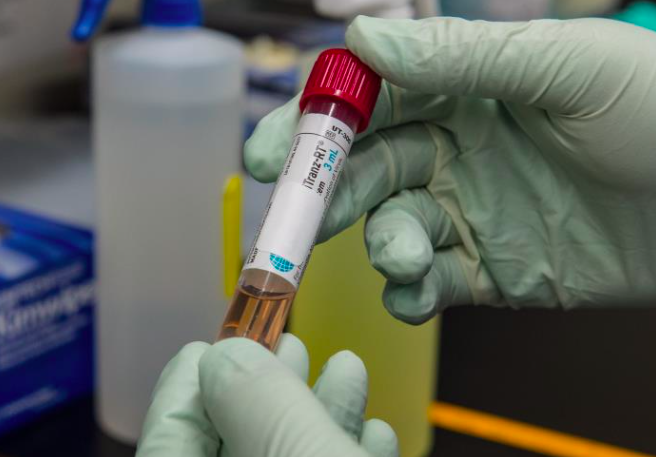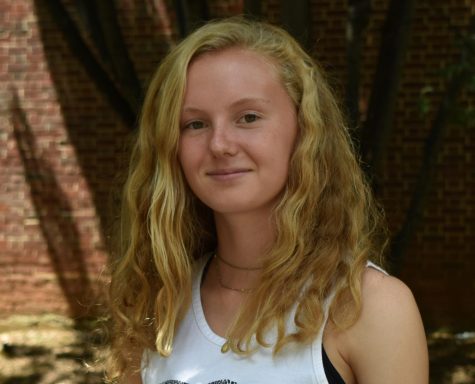Pandemic puts public health in the spotlight
A test tube with viral transport media that contained a patient’s sample to be tested for the presence of SARS-CoV-2, the virus that causes COVID-19. (provided by the CDC)
October 5, 2020
A novel disease that has significantly impacted the world continues to baffle the Centers of Disease Control, which was established nearly 70 years ago to address such pathogens. Public health professionals are struggling to fully understand its impact and correctly inform the public, which has seen the nation struggling with the repercussion. About 209,000 have died to date, but that could just be the tip of the iceberg.
With the significance of Covid-19, the field of public health and the immensity of its grip on society is becoming evident to professionals and the Grady community.
The front yards of many Grady students are lined with signs showing support for frontline workers in hospitals. In bold pink font, some read “thank you health care heroes #wecandoit” or “We will beat this together.” Essential workers continue to struggle under the strain of Covid, as well as those in public health.
Dr. Allisson Chamberlain, a faculty member at the Rollins School of Public Health at Emory University, believes that struggles are evident in the public health system.
“When public health isn’t working well, you end up with a situation like this,” Dr. Chamberlain said. “I mean there’s lots of challenges and lots of underlying inequities in our society that have gotten us to this point.”
The surfacing of Covid has allowed people to understand the impact that public health has on society. The current number of people infected with Covid, Dr. Chamberlain believes, reflects a struggling public health system.
However, public health can’t be directly associated with the doctors represented on television. Dr. Chamberlain describes her field as the study of “the intersections of science and society.”
“Public health is where you get to still help people from a health perspective, but on a population scale,” Dr. Chamberlain said.
Public health can be broken down into two fields: practice and academia. Many students may be more familiar with the practice side of public health.
Junior Izzy Friedman, a healthcare pathway student, finds she is more drawn to patient practice.
“I want to know that I can actually help somebody get better, and help influence their decision on what is best to do, and know that I’m actually making a difference,” Friedman said.
Although Friedman is drawn to directly caring for sick individuals, she has witnessed the adverse effects of a lack of knowledge of public health in the population.
“I noticed that quite a bit, the people who don’t wear masks don’t believe in it because the information really isn’t out there,” she said.
She has also noticed irrational theories about mask wearing.
“People will say, ‘it’s just protecting me from it’ or, ‘It’s just protecting them, but it’s not protecting me, I’m fine,’” Friedman said. “There’s actually people out there who think essential oils can protect them.”
Misinformation about the virus only highlights the importance of public health research and education.
“On the academic side, you have a lot of faculty and students doing research around public health interventions,” Dr. Chamberlain said. “This is like campaigns to stop smoking … and to figure out how those interventions can affect the population, but we are really looking at [health] from a research perspective.”
The research, as in the case of Covid-19, is shared with the public. Researchers at Emory and the CDC conduct countless studies that are shared weekly to keep the public informed on how to safely conduct themselves.
AP Biology teacher Nikolai Curtis says he loves that Covid is revealing the importance of science to the public, including his students.
“I’m really big on understanding science,” Curtis said. “A big reason why a lot of people don’t understand how things work in the world of science is because they don’t understand data.”
Curtis believes the key to understanding the impact of Covid is to pay attention to the statistics the CDC distributes.
“They think that if you see something once, it means it’s true, or if they don’t understand the data, then it’s not true,” Curtis said.
Curtis reflects on previous historical moments in which science helped keep the U.S. public safe. The 1968 pandemic of the H3N2 strain of influenza killed an estimated 100,000 in the U.S., Curtis said. However, he pointed out a difference in societal beliefs during Lyndon B. Johnson’s presidency and the period of Covid-19 today.
“That was a time when science was very important, from the sixties going into the seventies,” Curtis said. “For some reason, it’s just weird that now we’ve become very anti-science, and I don’t understand that.”
Curtis says he’s frustrated by the bi-partisan political stances many are taking on the issue. His goal is to teach students about Covid-19’s effects on the body through a scientific approach that avoids meddling with politics and is in a more intimate setting than the CDC can provide.
“Understanding the biochemical and evolutionary origins of science, they can go and say ‘Ok, most every problem in the world, especially illness, is really based down to a cellular problem,” Curtis said. “In the case of Covid-19, they can ask, ‘What does it attack?’”
He plans to integrate Covid into his lesson plans later this semester.
“Later on in the year, when you start talking more about genetics and stuff, I’m going to look into how to bring in Covid-19 as an idea,” Curtis said. “Like what does Covid-19 actually do cosmetically … we want people to understand what the real impact is … and, of course, the data.”
While some teachers are becoming facilitators of public health, student groups are hoping to play a similar role to educate their peers.
Sophomore Chloe Walker, is a board member of the Health Occupations Students of America’s (HOSA) Grady chapter. HOSA aims to attract students to healthcare, and wants to provide students knowledge during the pandemic.
“We want to help educate everyone on what’s going on,” Walker said. “Because when the virus first hit, it was foreign to everybody. It was a novel pandemic, so our goal was to just educate.”
The club plans to host an informational session.
“We’re planning a seminar soon with guest speakers, just talking about Covid and what you can do to stay safe, and also what healthcare will look like in the future,” Walker said. “We will have people from the CDC, Atlanta Medical Center and other hospitals around Georgia.”
Walker hopes to impact students’ understanding of the pandemic and prevent the spread of the virus and ignorance about it.
“Seeing what people are doing right now in the midst of a pandemic is shocking,” Walker said. “When you go out to the beach and then come back and do stuff with people, with Grady kids, that is what is preventing us from going back to school.”
Walker believes health agencies must reach out in a manner that “relates to teenagers.”
“With my sister … she is very committed to wearing her mask, very committed to washing her hands,” Walker said of her 12-year-old sister. “But the reason she’s committed is because she watches the news with us every night, and she sees the Covid rates going up, and every time my mom says, ‘that’s someone else who got Covid and can’t do anything anymore’”
As student groups and teachers promote Covid-19 and health education, Curtis emphasizes the importance of agencies such as the CDC and schools like Emory’s public health school.
“In your life, and as we’re seeing right now as the best example, you are going to be affected, in terms of public health,” Curtis said. “You are going to be faced with a decision related to healthcare, either on the part of yourself, or specifically, with someone you know and love.”
Curtis wants students to take responsibility for their own health.
“I said that to kids for years,” Curtis said. “The reason you want to know about science is you don’t want people who don’t know about science, or who know you don’t know about science, making the decision for you and leading to disastrous results.”








